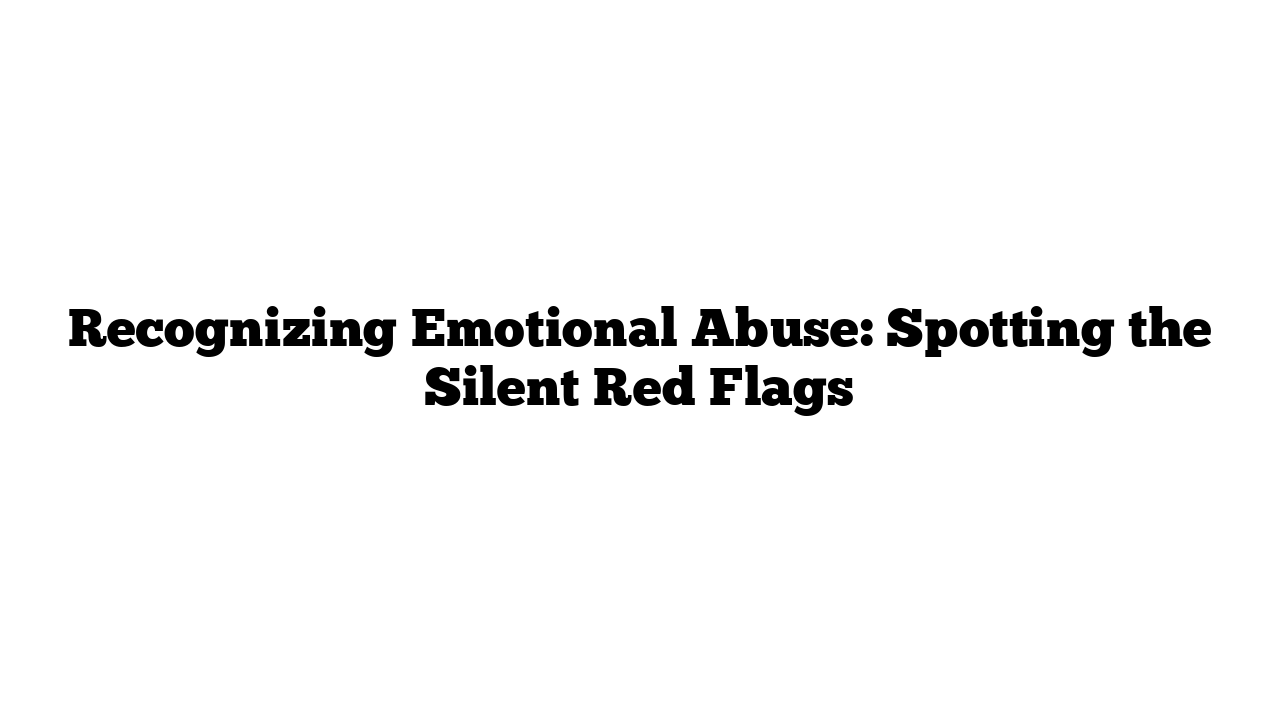Understanding Emotional Abuse
Spotting the red flags of emotional abuse can feel like wearing a tight mask. It suffocates you slowly, making you unaware until it’s too late. Have you ever experienced constant criticism or felt like you’re walking on eggshells? These silent signs of emotional abuse are often overlooked, yet they can significantly damage your emotional well-being.
In this article, we will explore the subtle signs of emotional abuse that many women overlook daily. By the end, you’ll know exactly what to watch for, empowering you to listen to your inner wisdom.
The Whisper of Emotional Abuse
Emotional abuse doesn’t shout. Instead, it whispers. It’s often found in small moments, like a dismissive glance or a passive-aggressive comment. It can even come from how someone makes you feel—doubting your emotions or questioning your reality.
Have you ever thought, “Was that really hurtful, or am I just overreacting?” This questioning is precisely how emotional abuse operates. It erodes your confidence bit by bit, leaving you uncertain about your feelings and experiences.
A Personal Story: Esther’s Journey
Let me share the story of a friend, whom we’ll call Esther. She is a smart, funny, and hardworking woman. At first, her relationship with her husband seemed perfect, and we all liked him. However, subtle changes began to unfold that were hard to notice at first.
Her partner started controlling aspects of her life, telling her what to wear and who to associate with, disguised as care. When Esther expressed hurt, he would dismiss her feelings, saying, “You’re just being too sensitive.” This manipulation made her doubt her emotions, leading her to believe she was overreacting.
The Turning Point
One day, Esther had a heated argument with her husband over wanting to take a pottery course. She explained that the class was only once a week for eight weeks and that she needed him to help with the kids. His response was belittling: “Why would you want to do that?”
During our coaching calls, we discussed her feelings of dismissal and how her husband’s behavior wasn’t just insensitivity; it was about control. Esther began to take action by journaling. She wrote down every uncomfortable encounter, which helped her recognize the pattern of emotional abuse.
The Invisible Cage of Emotional Abuse
Living with emotional abuse is like being in an invisible cage. You may not see the bars, but you can feel them pressing against you. This cage is built from control, manipulation, and self-doubt.
Every time Esther tried to express herself, her partner would say she was overreacting or remind her how lucky she was to have him. To avoid conflict, she changed her behavior, but the cage only tightened. The insidious nature of emotional abuse makes it challenging to spot; it builds slowly over time, trapping you without clear warnings.
The Patterns Emerge
Over the years, Esther kept journaling her experiences. Eventually, she noticed a pattern that helped her realize she wasn’t crazy—she was being emotionally abused and controlled.
If Esther’s story resonates with you, consider reading more about determining whether your marriage is worth saving. It’s essential to evaluate your situation carefully and understand your options.
Key Takeaways: Spotting the Red Flags
Emotional abuse is not merely about anger or aggression; it centers on control and making you feel powerless. Here are some signs to look out for:
- Constant Criticism: Frequent negative comments about your choices or feelings.
- Walking on Eggs: A persistent sense of anxiety about how your partner will react.
- Dismissing Feelings: Being told you are too sensitive or overreacting.
- Isolation: Being told who to spend time with or what to do.
If you notice these behaviors, don’t ignore them. Emotional abuse is real and can have lasting effects. Start documenting your feelings and experiences. Journaling helps you see patterns and fosters self-discovery.
Empowering Your Journey
Recognizing the red flags is the first step toward breaking free from emotional abuse. You deserve better, and it begins with acknowledging your situation.
Consider watching resources on turning your pain into power. These experiences can be transformed into strength. You are loved, and I genuinely believe that everyone deserves to be in happy, healthy relationships.
Remember, it all starts with you. Do the inner work to understand yourself, enabling you to bring that strength into your relationships.
Resources for Further Reading:
If you found this article helpful, visit medicaltimes.io for more insights on emotional well-being and relationships.
